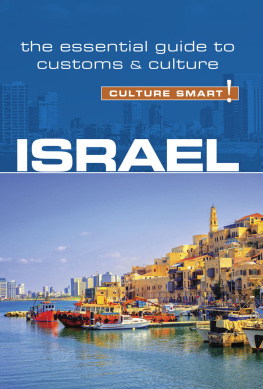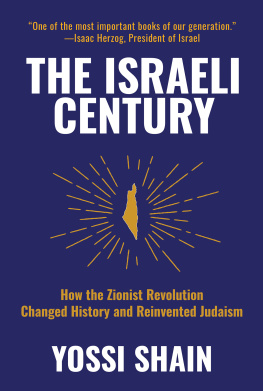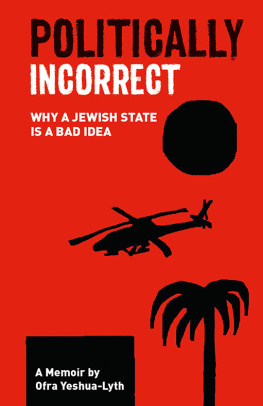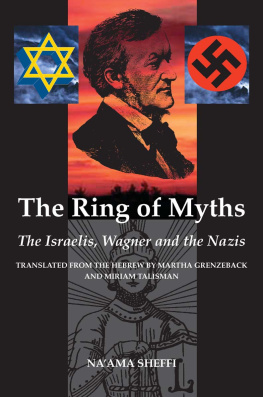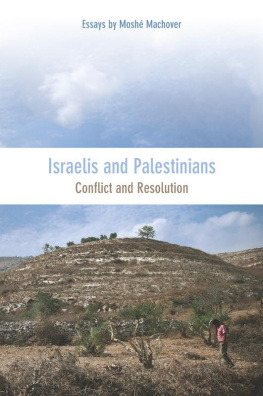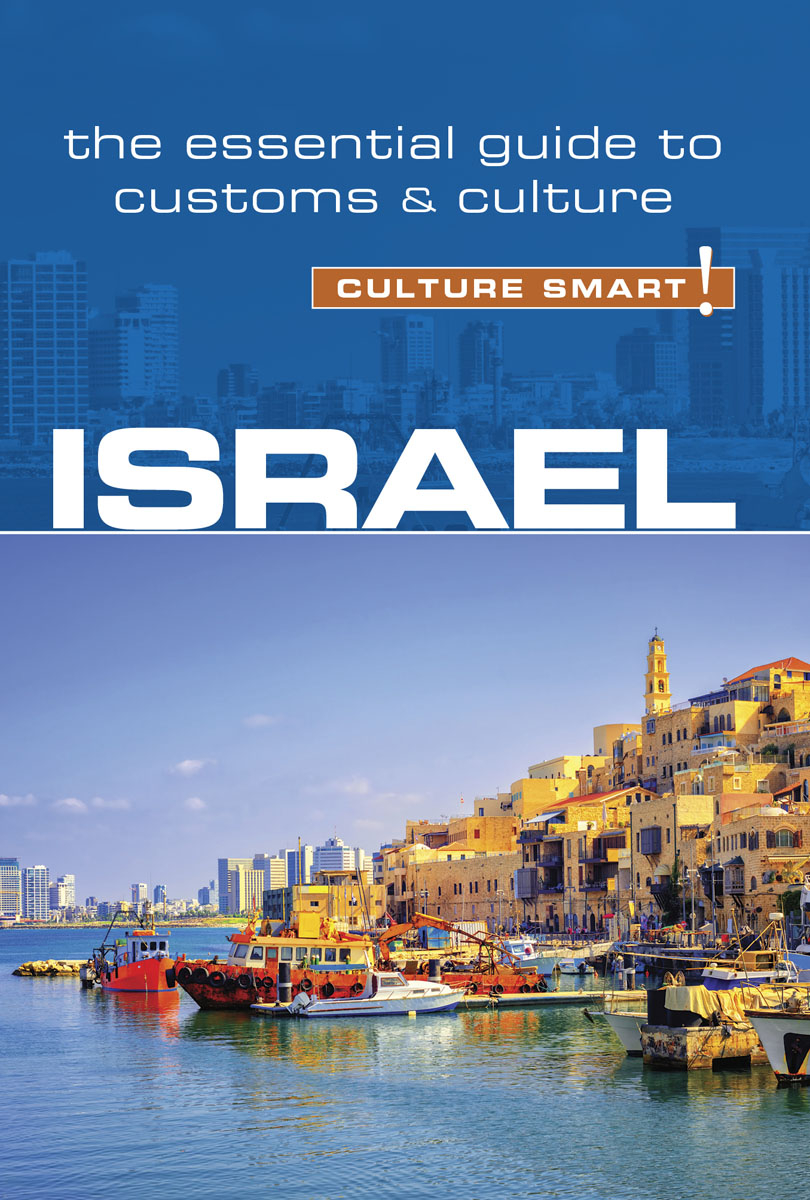
This book is available for special discounts for bulk purchases for sales promotions or premiums. Special editions, including personalized covers, excerpts of existing books, and corporate imprints, can be created in large quantities for special needs.
For more information contact Kuperard publishers at the address below.
ISBN 978 1 85733 882 9
British Library Cataloguing in Publication Data
A CIP catalogue entry for this book is available from the British Library
First published in Great Britain
by Kuperard, an imprint of Bravo Ltd
59 Hutton Grove, London N12 8DS
Tel: +44 (0) 20 8446 2440 Fax: +44 (0) 20 8446 2441
www.culturesmart.co.uk
Inquiries:
Series Editor Geoffrey Chesler
Design Bobby Birchall
Printed in India
Cover image: The port of Jaffa with the Tel Aviv skyl;ine in the background. Shutterstock.
The photo on is reproduced by permission of the Rubin family.
Images on the following pages reproduced under Creative Commons Attribution-Share Alike 4.0 International license: (top) Eurovaran.
Reproduced under Creative Commons Attribution-Share Alike 3.0 Unported license: Michael Plutchok.
Under Creative Commons Attribution-Share Alike 3.0 Germany license: Sheepdog85.
Creative Commons Attribution-Share Alike 2.5 Generic license: Original uploader was Hmbr at he.wikipedia.
Creative Commons Attribution-Share Alike 2.0 Generic license: askii.
Pages Israel Museum.
About the Authors
JEFFREY GERI was a South African-born barrister who made Israel his home in the early 1960s. Involved in all aspects of Israeli life, he brought up three Israeli sons and worked extensively in tourism and advertising. He wrote several novels, two of which, Oh Henry and The Trouble With Francis, were based on the theme of immigration to Israel. Sadly, Jeffrey died in 2013.
MARIAN LEBOR is a journalist, filmmaker, and teacher born and educated in London. After graduating in History from Queen Mary College, London University, she moved to Israel with her young family in 1994. She writes for a variety of English-language publications in Israel and abroad on Israel-related themes, and her work has appeared in The Guardian and in Anglo-Jewish newspapers. She currently produces short feature films that highlight Israels diversity and culture for online magazines.
The Culture Smart! series is continuing to expand. All Culture Smart! guides are available as e-books, and many as audio books.
For latest titles visit
www.culturesmart.co.uk
The publishers would like to thank CultureSmart!Consulting for its help in researching and developing the concept for this series.
CultureSmart!Consulting creates tailor-made seminars and consultancy programs to meet a wide range of corporate, public-sector, and individual needs. Whether delivering courses on multicultural team building in the USA, preparing Chinese engineers for a posting in Europe, training call-center staff in India, or raising the awareness of police forces to the needs of diverse ethnic communities, it provides essential, practical, and powerful skills worldwide to an increasingly international workforce.
For details, visit www.culturesmartconsulting.com
CultureSmart!Consulting and CultureSmart! guides have both contributed to and featured regularly in the weekly travel program Fast Track on BBC World TV.
contents
Map of Israel

introduction
Culture Smart! Israel sets out to condense an extremely complex subject into a compact guide that will help you discover the Israel behind the clichs. This dynamic, diverse, and paradoxical country is steeped in history and biblical associations, yet most Israelis are modern, secular, and energetically materialistic. Visitors from abroad will find much that is familiar, and more that is unexpected. To soften the impact of the latter, this book offers insights and essential human information that will deepen your understanding of the Israeli people and enable you to make the most of your visit.
Israel embraces its many visitorstourists, businesspeople, foreign representatives, pilgrims, and, most of all, those who have come to stay. The Israelis love showing off their country and its not inconsiderable accomplishments over seventy years of statehood. They glow when a returning guest says, I cant believe the development that I have seen, or when a business traveler says, Next time Ill bring my family, and they are genuinely upset when it happens, as is inevitable with over 3.5 million tourists a year, that the occasional visitor has a bad experience. Israelis like to be liked.
So, for now, Bon Voyage through these pages. You will read about the formative influence of Israels ancient and modern history, its geography, and what makes Israelis the way they are. You will acquaint yourself with Israels democratic institutions, rich cultural life, wide range of cuisines, sports and leisure opportunities, sandy beaches, and lively city streets, and you will understand its dilemmas.
The Israelis you will meet will be from all walks of life. They will be more or less sophisticated depending on their occupations, where they live, or where they were brought up. They will almost always be friendly, helpful, directperhaps to a faultand resourceful. Some will be well mannered; others wont. A few may be Holocaust survivors; many will be the children and grandchildren of Holocaust survivors. They will all carry with them memories of Israels wars, in which relatives, comrades, and loved ones fell in defense of the country.
Finally, you will learn what to expect and how to behave in different social circumstances, so that you can avoid misunderstandings and make genuine friends and valued business partners. Israelis are great travelers, and those whom you visit may one day visit you.
Bruchim Habaim! Welcome!
Key Facts
Official Name | The State of Israel | (Hebrew, Medinat Israel) |
Capital City | Jerusalem | Population approx. 860,000 |
Main Cities | Tel Aviv (pop. 438,000), Haifa (pop. 279,590), Beersheba (pop. 205,810) | Other cities: Netanya, Eilat, Nazareth, Tiberias, Ashdod, Rishon Lezion, Petach Tikva |
Population | 8.68 million | 6.484 million Jews; 1.808 million Arabs (Muslim, Christian, Druze, Bedouin); 388,000 others (Christians who arent Arabs, other religions, people without religion) |
Area | 1967 borders: 8,019 square miles (20,770 sq. km) | Slightly smaller than both New Jersey and Wales |
Location | Eastern Mediterranean, between Gaza and Lebanon |
Terrain | Varied: coastal plain; hilly northern and eastern regions; Jordan Valley; Negev desert in south |
Coastline | 170 miles (278 km) |
Climate | Mediterranean temperate |
Next page
